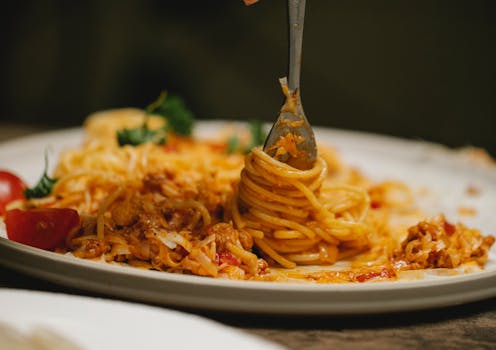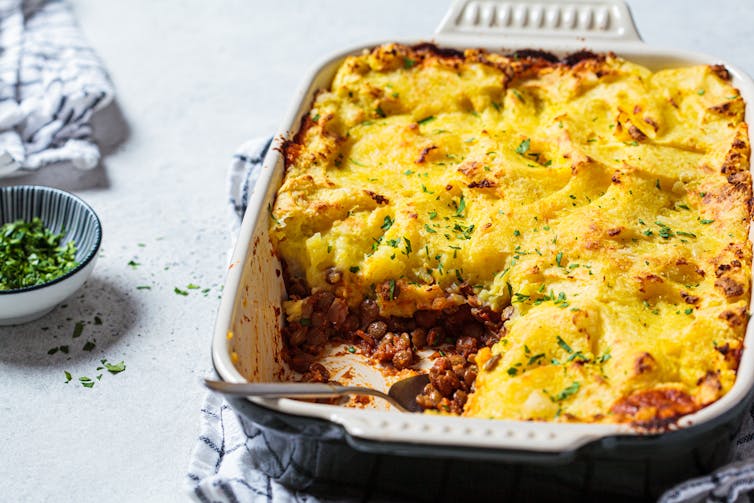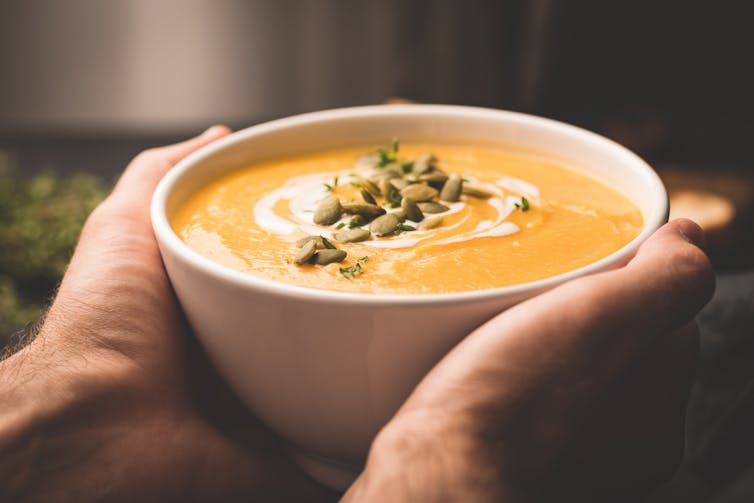Source: The Conversation (Au and NZ) – By Lauren Ball, Professor of Community Health and Wellbeing, The University of Queensland

As we move through Autumn, parts of Australia are starting to see cooler weather. For some of us, that can mean increasing feelings of hunger and cravings for “comfort food” such as as pasta, stews and ramen.
But what’s happening in our body?
3 things change when it gets cold
1. Our body conserves heat
It sends this energy it conserves to our internal organs so they can maintain their temperature and work properly. The body can also perform heat-generating activities (such as shivering), which uses energy. The body will then look for additional energy through calories from eating food.
2. Our body warms up when eating
When we eat, the body needs to expend energy to digest, absorb, and metabolise the nutrients. This process requires the use of energy, which generates heat in the body, leading to an increase in body temperature termed “diet-induced thermogenesis”.
However, the amount of energy used to keep us warm is quite modest.
3. Some people experience a drop in the neurotransmitter called serotonin
This is partly because the rate our body produces serotonin is related to sunlight, which is lower in winter.
Serotonin helps to regulate mood, appetite, and sleep, among other things. When serotonin levels are low, it can lead to increased hunger and decreased satiety (feeling that you’ve had enough to eat), making us feel hungrier and less satisfied after meals.

Shutterstock
Why we love comfort food in winter
Many of us struggle to eat salad in winter and crave mum’s chicken soup or a slow cooked, brothy ramen.
Research shows our brain detects the cold weather and looks for warm food. Warm food can provide a sense of comfort and cosiness, which is particularly appealing during the colder months when we spend more time indoors.
Read more:
The psychology of comfort food – why we look to carbs for solace
Comfort food can mean something different for everyone. They are foods we reach for in periods of stress, nostalgia, discomfort (like being cold), or emotional turmoil. For most of us, the foods we often over-indulge in are rich and carbohydrate heavy.
A drop in serotonin has also been shown to stimulate an urge to eat more carbohydrate-rich foods such as gnocchi, pasta, ragout, mashed potatoes.
What happens to those extra calories?
If you consume more energy in cooler weather, some of it will be used to keep you warm. Beyond keeping us warm, extra calories we consume are stored.
While most humans today have access to a year-round food supply, some research shows our bodies may still have some leftover instincts related to storing energy for the cooler months when food was harder to come by.
This behaviour may also be driven by biological factors, such as changes in hormone levels that regulate appetite and metabolism.
Read more:
Gaining weight in winter isn’t inevitable, unless you decide you will
A fundamental principle of nutrition and metabolism is that the balance between the energy content of food eaten and energy expended to maintain life and to perform physical work affects body weight. This means any excess energy that we don’t use will be stored – usually as fat.
Using mathematical modelling, researchers have predicted weight gain is more likely when food is harder to find. Storing fat is an insurance against the risk of failing to find food, which for pre-industrial humans was most likely to happen in winter.

Shutterstock
It doesn’t have to be unhealthy
No matter your cravings during cooler months, it’s important to remember your own personal health and wellbeing goals.
If you’re worried about excess energy intake, a change in season is a great time to rethink healthy food choices. Including lots of whole fresh vegetables is key: think soups, curries, casseroles, and so on.
Including protein (such as meat, fish, eggs, legumes) will keep you feeling fuller for longer.
Read more:
A nice warm bowl of porridge: 3 ways plus a potted history
![]()
Lauren Ball works for The University of Queensland and receives funding from the National Health and Medical Research Council. She is a Director of Dietitians Australia, a Director of the Darling Downs and West Moreton Primary Health Network and an Associate Member of the Australian Academy of Health and Medical Sciences.
Emily Burch works for Southern Cross University.
– ref. 3 reasons you feel hungrier and crave comfort foods when the weather turns cold – https://theconversation.com/3-reasons-you-feel-hungrier-and-crave-comfort-foods-when-the-weather-turns-cold-202831







